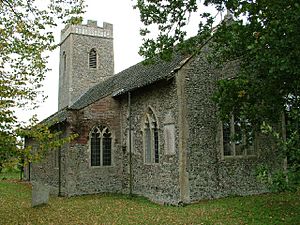St Faith's Church, Little Witchingham facts for kids
Quick facts for kids St Faith's Church, Little Witchingham |
|
|---|---|

St Faith's Church, Little Witchingham,
from the southeast |
|
| Lua error in Module:Location_map at line 420: attempt to index field 'wikibase' (a nil value). | |
| OS grid reference | TG 115 203 |
| Location | Little Witchingham, Norfolk |
| Country | England |
| Denomination | Anglican |
| Website | Churches Conservation Trust |
| History | |
| Dedication | Saint Faith |
| Architecture | |
| Functional status | Redundant |
| Heritage designation | Grade II* |
| Designated | 22 July 1983 |
| Architectural type | Church |
| Style | Gothic |
| Groundbreaking | 12th century |
| Specifications | |
| Materials | Flint with stone and brick dressings |
St Faith's Church is a very old church in the village of Little Witchingham in Norfolk, England. It is no longer used for regular church services. Instead, a special group called the Churches Conservation Trust takes care of it.
The church is located in a quiet area, surrounded by country lanes. It is about 14 kilometers northwest of Norwich. It is also about 5 kilometers south of Reepham. St Faith's Church is famous for its amazing old wall paintings from the Middle Ages. It is also a special historic building, protected because it is so important.
Contents
History of St Faith's Church
The church started being built way back in the 1100s. Most of what you see today was built in the 1300s. The tall tower was added later, in the 1400s.
By the 1930s, the church was not used anymore. It started to fall apart and became a ruin. But in 1967, a person named Eve Baker found something amazing! She climbed through a window and discovered old wall paintings from the Middle Ages.
These paintings were carefully fixed. The church was also repaired by different groups. Now, the Churches Conservation Trust takes care of it. The church is usually locked to keep it safe. This is because some of its floor tiles were stolen in 2008. But you can get a key nearby to visit.
Church Architecture and Design
The church is built mostly from flint stones. It also has stone and brick details. The church has a main hall called a nave. It also has a smaller section on the south side called an aisle. There is a special area for the altar called a chancel. At the west end, there is a tall tower.
The tower does not have buttresses, which are supports on the outside. Its top edge, called a battlement, is decorated. It has a fancy band of carving called a frieze. It also has special patterns made from different colored stones, called flushwork.
Along the south side of the aisle and chancel, there are windows with two sections. The window at the east end has three sections. On the north wall, there is a doorway that has been blocked up. Inside the church, the south aisle has arches supported by eight-sided pillars. These arches have zigzag patterns. The roof of the nave and chancel was built in the 1700s.
Medieval Wall Paintings
The wall paintings in St Faith's Church were made in the middle of the 1300s. Some of them are damaged, but many are still visible. Round pictures in the arches show the Four Evangelists. These are the writers of the four Gospels in the Bible.
Along the top of the south wall, there is a painting of the apostles standing around Jesus after he rose from the dead. Below this, there are paintings showing events from the Passion of Christ. This tells the story of Jesus's last days. Underneath these paintings, there are decorations with vines and swirling patterns.
Other paintings in the church are not as clear. One shows parts of Saint George fighting the Dragon. Another is thought to have shown Saint Christopher. There might also be a painting of "The Three Living and the Three Dead."
See also
 | Ernest Everett Just |
 | Mary Jackson |
 | Emmett Chappelle |
 | Marie Maynard Daly |

